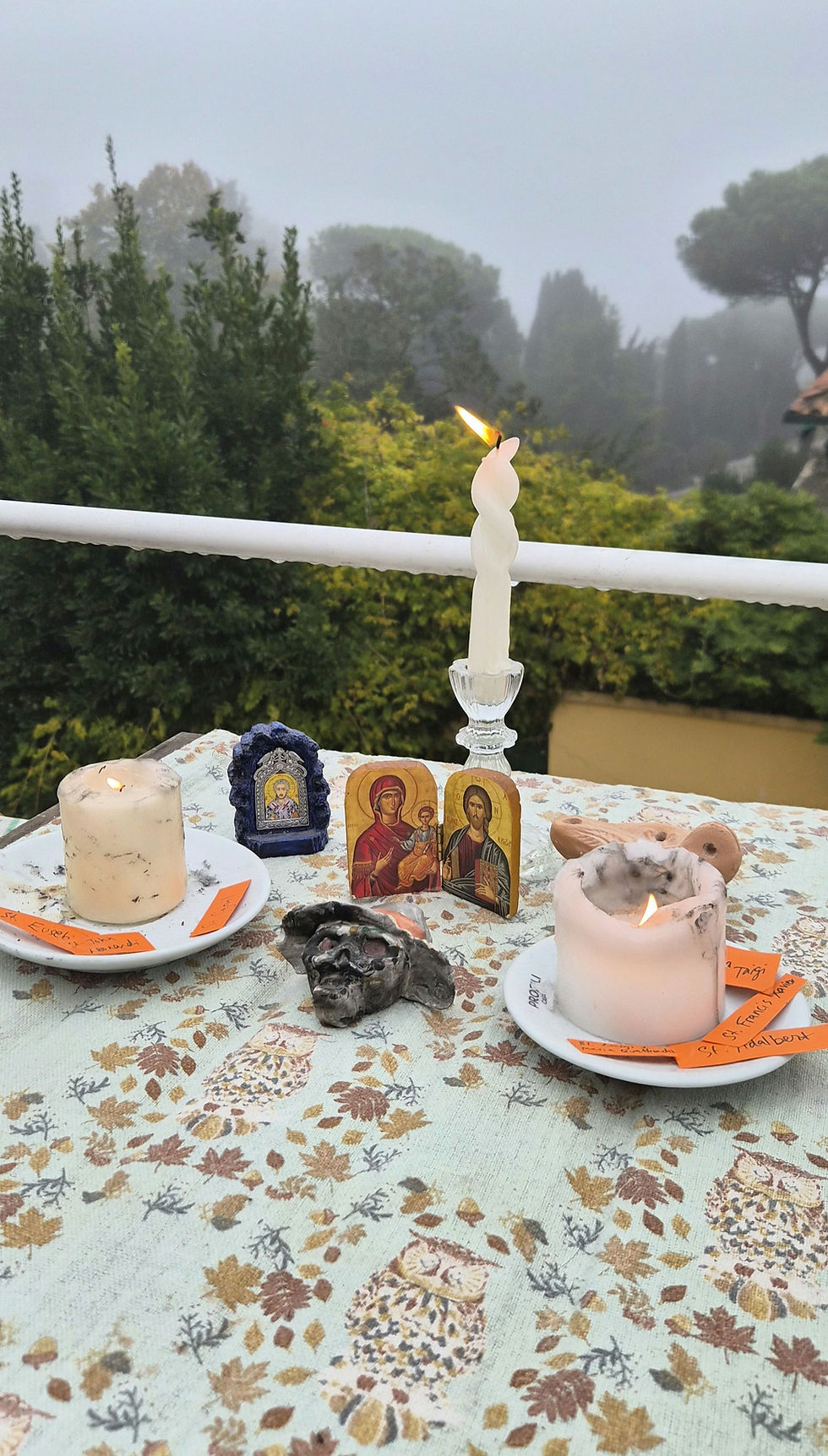Calendar Class of November 2, 2025
- Andrea Kirk Assaf

- Nov 2
- 4 min read
A Carpe Diem Snapshot:

One misty, moisty, morning,
When cloudy was the weather,
There I met an old man,
Clothed all in leather,
Clothed all in leather,
With a cap under his chin.
How do you do?
And how do you do?
And how do you do again?
The morning broke all misty and moisty, creating a shroud for the dome of St. Peter's Basilica, where only yesterday we sat baking beneath summery sunshine for the Feast of All Saints. Today's weather is much more liturgically appropriate for the Feast of All Souls, which is traditionally observed with an open-air Mass in cemeteries, where floral wreaths are laid and candles are lit all around family tombs, a tradition stretching back to the Romans and beyond. At home, too, little shrines (ofrendas) are set up to remember the dead this month, through the intercession of the saints we celebrated yesterday. This year our students are in Poland, where cemeteries are lit up with candlelight in a similar fashion to what Americans are used to seeing in Mexico's Día de los Muertos celebrations. Picnicking with the ancestors by their graves even used to be an American tradition in the not-so-distant past (my parents used to go for a Sunday drive with great Aunt Fay to visit cemeteries around Michigan in their early years of marriage). Today in Rome the Roman Pontiff is continuing this tradition with a Mass at the large cemetery Campo Verano, near the paleo-Christian Basilica of San Lorenzo (I will update this post with links from today's papal events once they are released). With a forecast of drizzle, it should be very atmospheric. It's a Memento Mori kind of day.
Extra: the long history of picnics!
Liturgical: The Commemoration of All the Faithful Departed (All Souls' Day)
November 2nd is All Souls Day, sometimes called the Day of the Dead. On this day, and during the month of November, the Church prays in a special way for the souls of the faithful departed, and individuals pray especially for those whom they have known and loved. The Holy Souls in purgatory died in the mercy of God, thus they are called "holy." However, because they still had attachment to sin at the time of their death, they must undergo the spiritual purification of their souls before they are able to fully love God with their whole heart, mind, and soul for all eternity. As they are nevertheless part of the communion of saints, they depend upon us to help ease their suffering and quickly advance them through their purification so that they can join the saints in heaven. Those in purgatory cannot pray for themselves, this is why they are also called "poor." They can no longer merit anything for themselves and rely entirely on living souls to pray and make sacrifices on their behalf.
Bishop Barron's Sunday Sermon: Why We Pray for All Souls
Fr. Plant's Homily-Scripture Lesson: The Resurrection of the Body
An Overview of the Liturgical calendar and devotions of the month of November.
Sanctoral: The Church, after rejoicing yesterday with those of her children who have entered the glory of heaven, today prays for all those who, in the purifying suffering of Purgatory await the day when they will be joined to the company of saints. At no place in the liturgy is stated in more striking fashion the mysterious union between the Church triumphant, the Church militant and the Church suffering; at no time is there accomplished in clearer fashion the twofold duty of charity and justice deriving for every Christian from the fact of his incorporation in the mystical Body of Christ. By virtue of the consoling doctrine of the communion of saints the merits and prayers of each one are able to help all; and the Church is able to join her prayer with that of the saints in heaven and supply what is wanting to the souls in Purgatory by means of the Mass, indulgences and the alms and sacrifices of her children.
Natural: Recipes for picnicking with the dead
Italian: Fare la scarpetta (Using bread to soak up sauce)
Quote: Many are heading straight on for purgatory. They live until their last hour, even though they are seriously ill, even on their deathbed, as if everything is all right. Exclusively directed to the earthly, they don’t think at all about calling upon the mercy of God. Although by doing so they would be spared at least a severe purgatory. For God is infinitely merciful for all who call upon Him and trust Him." —Hungry Souls, p. 120
An excerpt from Hungry Souls by by Gerard J.M. van den Aardweg
Extra: Rome's "Purgatory Museum" at the hauntingly beautiful neo-Gothic church of Sacro Cuore del Suffragio and the "Bones Chapel" Capuchin Crypt in Rome


Comments